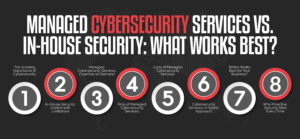
Managed Cybersecurity Services vs. In-House Security: What Works Best?
One click. That’s all it takes for a cyberattack to cripple your business.
It could be a phishing email, a poor password, or a system that has not been patched yet; modern cybercriminals just need a small opening to create enormous damage. For companies of all sizes, the question isn’t if an attack will happen, but when.
That’s why choosing the right defense strategy is critical. Should you rely on your in-house IT staff, or is it smarter to turn to experts offering managed cybersecurity services? This choice might be the one that would make the difference between remaining safe and appearing in the morning paper.

The Growing Importance of Cybersecurity
The global cost of cybercrime is expected to reach $10.5 trillion annually by 2025 (Cybersecurity Ventures). That staggering figure highlights why companies must prioritize robust protection. Businesses should implement operational cybersecurity, whether in-house or outsourced, that will help them remain resilient. However, the truth is that cybersecurity is not a single upfront investment. It involves continuous monitoring, updating, and adjusting to emerging threats. This is why a number of firms are looking to managed cybersecurity services to provide protection 24 hours a day.In-House Security: Control with Limitations
Many organizations favor in-house security teams because they give them direct control. An IT team is committed to the company and knows its system, culture, and processes. This results in quicker in-house communication and a customized approach to particular needs. Developing and retaining a competent in-house staff is not simple or inexpensive. The expenses on salaries, training, benefits, and tools are quick to add. Cyber threats are becoming more advanced, and it is necessary to be a specialist in a variety of domains such as cloud security, endpoint protection, compliance, and threat detection. Not many small or medium corporations are able to afford such an extensive repertoire of skills in-house. Pros of In-House Security:
Pros of In-House Security:
- Control of systems and processes directly.
- Quick feedback from the internal personnel.
- Intensive understanding of company activities.
 Cons of In-House Security:
Cons of In-House Security:
- Expensive aspects of personnel and training.
- Lack of expertise in comparison with specialist providers.
- Hard to increase with threats.

Managed Cybersecurity Services: Expertise on Demand
Managed cybersecurity services would provide businesses with access to expert knowledge, high-tech tools, and 24/7 monitoring without the cost burden of establishing a home security personnel. Managed Security Service Providers (MSSPs) are partners who will always ensure your systems are patched, compliant, and secure. These providers not only respond to the threat but also actively track networks, detect vulnerabilities, and apply preventative controls. With cybercrime ever-changing, the availability of a team of professionals who breathe, eat, and sleep security is a great benefit.Pros of Managed Cybersecurity Services:
- Access to top-tier expertise and tools
- 24/7 monitoring and incident response
- Scalable solutions tailored to business size
- Cost-effective compared to building an internal team
Cons of Managed Cybersecurity Services:
- Less direct control compared to in-house staff
- Requires strong collaboration and trust with the provider
Cybersecurity Services: A Hybrid Approach
Whereas some businesses prefer to stick to a single approach, a hybrid model is advantageous to others. This model integrates internal expertise and outside cybersecurity providers. For example, an in-house IT department may perform routine daily tasks and support staff. At the same time, a managed care provider may assume the role of more sophisticated threat monitoring and compliance control. This allows businesses to retain certain control, enjoy external experience, and reduce costs. The hybrid has been the best alternative for many small and medium-sized enterprises.Which Works Best for Your Business?
Choosing between in-house security and managed cybersecurity services will depend on your business’s resources and risk exposure. These are some of the main factors that should be taken into consideration:- Business Size/ Budget: Since smaller businesses allocate fewer resources to in-house teams than larger ones, outsourcing in smaller companies can be less expensive.
- Industry Compliance: A managed provider can guarantee compliance with minimal internal work effort in a highly regulated industry (e.g., health care or finance).
- Threat Landscape: Organisers that work with sensitive details of customers or intellectual property are more vulnerable and can gain higher benefits when using advanced managed services.
- Scalability: Expanding businesses require solutions that can scale without blowing the budget- a strength of managed cybersecurity services.
Why Proactive Security Wins Every Time
Whichever security model you adopt, the most important thing is to transition towards an active rather than a reactive security approach. Cyberattacks may bring businesses to their knees, ruin their reputations, and cause considerable loss of money. Through cybersecurity services that consist of monitoring, risk evaluation, and proactive defenses, firms will be a step ahead of the attackers. Managed cybersecurity services can frequently meet the flexibility and expertise required to implement this proactive position without overwhelming internal teams.Final Thoughts
In-house teams and outsourced solutions are best for protecting businesses against current cyber threats. Yet, for most organizations, particularly small and midsize companies, managed cybersecurity services provide an economical, scalable, and expert-oriented solution. They offer round-the-clock vigilance, sophisticated technology, and preemptive measures that most internal forces cannot keep up with. Security is no longer the choice; selecting the appropriate model can be the key to survival in a digital-first world. In most businesses, managed services provide the competitive advantage required to remain secure, compliant, and resilient.Related Blogs
 Cybersecurity on a Budget: Strategies for an Economic Downturn - When budgets tighten, cybercriminals don’t slow down; they get smarter. Economic recessions provide the ideal storm for businesses: limited resources, heightened pressure, and more attacks on organizations that skimp on security. This is why it is even more important to consider investing in managed cybersecurity services when the budget is limited, not less. During unstable […]
Cybersecurity on a Budget: Strategies for an Economic Downturn - When budgets tighten, cybercriminals don’t slow down; they get smarter. Economic recessions provide the ideal storm for businesses: limited resources, heightened pressure, and more attacks on organizations that skimp on security. This is why it is even more important to consider investing in managed cybersecurity services when the budget is limited, not less. During unstable […] Why Proactive Cybersecurity Management Beats Post-Attack Recovery Every Time - Imagine waking up to headlines about your company’s data being leaked. The systems are down, clients are panicking, and recovery teams are scrambling. Hours feel like days, and every moment costs more than the last. This isn’t a distant nightmare anymore. It’s a daily reality for businesses that choose to react instead of prevent. In […]
Why Proactive Cybersecurity Management Beats Post-Attack Recovery Every Time - Imagine waking up to headlines about your company’s data being leaked. The systems are down, clients are panicking, and recovery teams are scrambling. Hours feel like days, and every moment costs more than the last. This isn’t a distant nightmare anymore. It’s a daily reality for businesses that choose to react instead of prevent. In […] Why Managed Cybersecurity Services Are No Longer Optional - Every 39 seconds, a cyberattack occurs somewhere in the world. In fact, global cybercrime damages are projected to reach $10.5 trillion annually by 2025 (Cybersecurity Ventures). This rising menace is no longer a remote possibility to businesses of all sizes: it is a day-to-day reality. The increased remote working, cloud usage, and digital-first approaches have […]
Why Managed Cybersecurity Services Are No Longer Optional - Every 39 seconds, a cyberattack occurs somewhere in the world. In fact, global cybercrime damages are projected to reach $10.5 trillion annually by 2025 (Cybersecurity Ventures). This rising menace is no longer a remote possibility to businesses of all sizes: it is a day-to-day reality. The increased remote working, cloud usage, and digital-first approaches have […]
Schedule a Consultation
Contact McLane Intelligent Solutions and Experience Texas IT Services Without The Geek Speak
